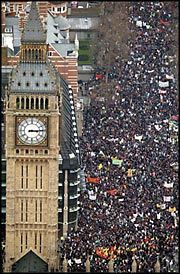A Soapbox for All: British Muslims and the Fight for Young Muslims' Minds (Part I: Muslims in a Secular World)
As spotlight intensifies on Barak Obama and his possible Muslim past/Madrassa education, Bush announces a "surge" in Iraq, 20, 000 strong, Hamas celebrates a year in government, and the British Education Ministry declares a plan to school children in "British Citizenship." Meanwhile the international posterwoman for CNN, Christiane Amanpour, comes up with a riveting documentary on Islam in Britain, curiously entiteld, "The War Within."
Arguably the world's most famous female journalist, inveterately chic, Amanpour is interested in uncovering not just the radicalization among many of Britain's Muslims, but also the wedge between "Extremist" and "Moderate" Muslims (why the flipside of "Extremist" is not "Mainstream" but "Moderate" I'll never understand).
Amanpour reports feeling after 7/7, "shocked beyond words that young British Muslims, born and bred here (London), would go to that extreme."

Among reasons for extremism that Amanpour unearths, are the Iraq war, Anglo-American foreign policy, and American foreign forays which are increasingly seen by British Muslim youth as wars against Muslims and Islam. She also touches upon racism and/or Islamophobia, but not nearly as thoroughly as I would have liked. This is a topic for a lengthier discussion that Jajabor will revisit (stay tuned for Islam in a Secular World part II) . For now, one has to merely remind herself of the BBC TV documentary "The Secret Policeman" aired in October 2003 and the odious racist bile spewed by unsuspecting cops videotaped by an undercover journalist.
Of course, there is also the recent furor over lovely Shilpa Shetty being bullied on screen on Britain's favorite TV reality show "Big Brother." Jade Goody tells recommends to an already beleagured Shilpa, "you need a day in the slums...[where] people look up to you." Another participant points out, "she [Shilpa] can't even speak English properly" and wonders if "people in India eat with their hands." Empire hasn't struck back quite yet has it.
Another shortcoming of Amanpour's documentary is the absence of any discussion of the British Left. Afterall, a variety of British Muslim discouses borrow from and interact with Leftists discourses on international affairs, foreign policy, as well as public affairs such as social welfare. Leading public figures such as George Galloway and Tariq Ali are hero-worshipped by both communities (they overlap too!).

Although Amanpour interviews one Muslim woman of small comedy-club fame, who made a clear case for her distance from her extremist brethren, British Muslim women's voices were surprisngly lost in the documentary. Almost as if Amapour was operating within the discursive paradigm and boundaries as laid out by the extremist mullahs she derides.
While admittedly, a confident modern British Muslim woman who could have furthered the case for more likable British Islams, are unlikely to roam the streets of Bricklane, Southhall or Edgeware road, one just has to walk into the Queen Mary cafetaria or the charmingly decadent SOAS Bar to get a representative Muslim woman voice.
Despite all despites, Amanpour does a decent job. Kudos where kudos are due. She punctuates a wonderfully crafted narrative on the radicalization of British Muslim youth with extended dialog with the "Moderates." She interviews Hanif Qadir who runs a large youth center in London, the said female comedian, an musician who is interested crossing cultures, and a good imam who declares, "If you are evil, you can justify it with anything – Bible, Qur'an or Shakespeare."
Finally, the documentary is laudable for capturing certain priceless moments. There are great scenes of angry Muslim youth demonstrating outside a Catholic Church and locked in diatribe with irate Christian youth, in the wake of the Pope's now-infamous remarks.
Towards the end, there is another entertaining debate between a young "Moderate" Muslim man having a go at the more "Extremist"Uncles. All well and good, but in this scene and in a few others, I questioned the air of false credence to a notion that civilizational debates may at the end be timelessly generational.
A young "Moderate" Muslim man declares, to much applause from a British audience, "This [extemist Islam], ladies and gentlemen, is not an ideology, but a mental illness."

No comments:
Post a Comment